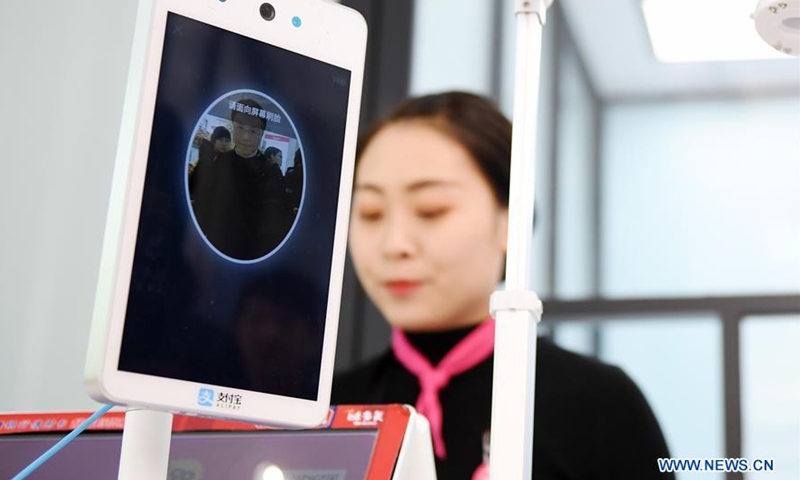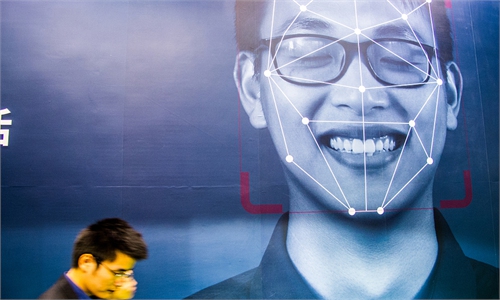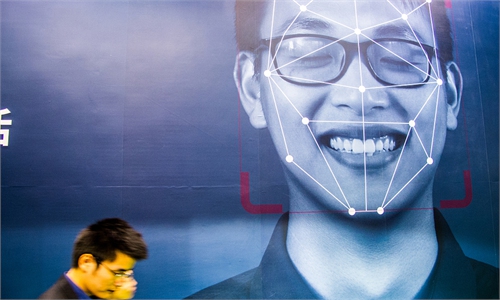Tech supplier to Chinese unit of Kohler conducts internal investigation following concerns raised for biometric data breaches

A customer uses a facial recognition payment equipment dubbed "Dragonfly" at a bakery shop in Beijing, capital of China, Dec 27, 2018.File photo:Xinhua
Wandianzhang, a facial recognition camera supplier to the Chinese unit of US kitchen and bathroom products maker, Kohler, has set up a special working group to urgently conduct an internal investigation. The move comes after the state broadcaster denounced the widely installed face-capturing cameras at China's annual Consumer Rights Day TV show late Monday.
With the evening gala drawing attention to privacy and security threats regarding the increasingly prevalent use of facial recognition, industry observers are calling for a ramped-up legislative push to hold technology suppliers and users accountable for biometric data breaches.
In a statement posted on its official website, Wandianzhang, a video surveillance system supplier in Suzhou, East China's Jiangsu Province, said that it has established a special working group in a swift response to the evening gala coverage.
The popular TV show revealed that Wandianzhang's cameras with facial recognition software were installed in multiple Chinese retailers of Kohler to trace and record the faces of those visiting store, and even recognize the mood of the customers.
Kohler's China unit quickly responded with a statement saying that it was uninstalling the equipment from its outlets, adding that the data from the system was only used to record customer numbers and it wasn't stored, analyzed or transferred, media reports said.
The facial recognition camera maker also said that the biometric data collected by their products is only used to help companies analyze their customers and will not be leaked out, media reported Tuesday, citing its management. The popular milk tea brand, Heytea, also refuted having collected biometric information from customers, although they have installed the surveillance cameras that are equipped with facial recognition technology.
Still, the violation of people's biometric data privacy, as denounced by the TV show, has the public and industry watchers urging for a swifter legislative push to update the regulatory framework and catch up with the advances in technology.
Obtaining customers' facial information without a notice or authorization from the individual is a violation of the regulations published by State Administration for Market Regulation in March 2020.
Experts said concerns over the privacy and security of people's personal information exposed in the facial recognition cases has heighten the urgency for regulating the collection of biometric data.
China is legislating the personal information protection law to better suit the people's personal data protection needs.
Major tasks set by China's top legislature for 2021 include a legislative push for new technologies, applications in the spheres of digital economy, internet finance, artificial intelligence and big data and cloud computing.
Zhang Yi, CEO of Guangzhou-based iiMedia Research Group, told the global Times on Tuesday that the current regulations on biometric data, like facial information, are general and lacks specific legal tools to regulate the context in which technologies can be used to obtain people's biometric data and how to punish those persons and entities that violate the laws and regulations.
"People's facial information is unique and its abuse puts people's fortune and safety in risks," Zhang said.
Protecting people's personal information is an urgent task worldwide. The Council of Europe published in January the convention on the protection of personal data and automatic processing, in which the legal basis to use facial recognition technologies in both public and private sectors are clarified.
Global Times



